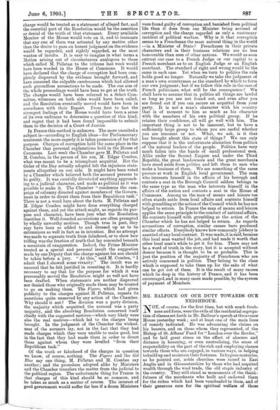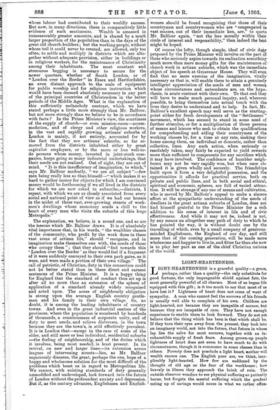MR. BALFOUR ON OUR DUTY TOWARDS OUR NEIGHBOUR. N OT, of
course, for the first time, but with much fresh- ness and force, were the evils of the residential segrega- tion of classes set forth in Mr. Balfour's speech at Grosvenor House yesterday week ; and at least one of the main lines of remedy indicated. He was advocating the claims on his hearers, and on those whom they represented, of the Bishop of St. Albans' Fund for " London over the Border," and he laid great stress on the effect of absence and distance in lessening, or even neutralising, the sense of responsibility on the part of the rich and employing classes towards those who are engaged, in various ways, in helping to build up and maintain their fortunes. In bygone centuries, as he pointed out, noble churches were raised in East Anglia and in Gloucestershire by those who had acquired wealth through the wool trade, the old staple industry of the country. They still stand as monuments of the thank- fulness of the merchants who built and endowed them for the riches which had been vouchsafed to them, and of their generous care for the spiritual welfare of those Whose labour had contributed to their worldly success. But now, in many directions, there is comparatively little eVidence of such sentiments. Wealth is amassed in immeasurably greater amounts; and is shared by a much larger proportion of the population than in the days of the great old-church-builders; but the working people, without whose toil it could never be created, are allowed, only too often, to settle and multiply in districts which are alto- gether without adequate provision, either in buildings or in religious workers, for the maintenance of Christianity among their inhabitants. The most constant and strenuous begging is necessary to secure for the newer quarters, whether of South London, or of "London over the Border" in Essex and Hertfordshire, an even distant approach to the scale of equipment for public worship and for religious instruction which would have been deemed absolutely necessary in any part of the principal countries of Christendom in the better periods of the Middle Ages. What is the explanation of this sufficiently melancholy contrast, which we have stated perhaps a little more strongly than Mr. Balfour, but not more strongly than we believe to be in accordance with facts ? In the Prime Minister's view, the scantiness of the supply of church—or even mission-room—accom- modation, and of clergy and other religious workers, in the vast and rapidly growing artisans' suburbs of London is mainly, if not entirely, accounted for by the fact that they are artisans' suburbs, so far re- moved from the districts inhabited either by great capitalist employers, or by the more or less well-to- do persons whose money, invested in joint-stock com- panies, keeps going so many industrial undertakings, that their needs are not realised. Out of sight, they are out of mind. " It is this insufficiency of imagination, to which," says Mr. Balfour modestly, " we are all subject "—few men being really less so than himself—" which makes it so hard to gather money for objects for which I am convinced money would be forthcoming if we all lived in the districts for which we are now asked to subscribe,—districts, I repeat, with which we are as closely associated from every social and national point of view as if we had our houses in the midst of those vast, ever-growing streets of work- men's dwellings whose monotony sends a chill to the heart of every man who visits 'the suburbs of this huge Metropolis."
The explanation, we believe, is a sound one, and so are the lessons which Mr. Balfour draws. It is of absolutely vital importance that, in his words, " the wealthier classes of the community, who profit by the work done in these vast areas of artisan life," should " recognise, and in imagination make themselves one with, the needs of those who occupy them " ; that they should "feel towards this London over the Border' as they would feel if a fragment of it were suddenly conveyed to their own park gates, as it were, and were made a portion of their own village." The call of patriotic, of Christian, duty in this connection could not be better stated than in these direct and earnest sentences of the Prime Minister. It is a happy thing for England that the standard of conduct thus set up is Alter all no more than an extension of the sphere of application of a standard already widely recognised and acted. upon. The sense of neighbourly obligation is strong upon the average English country gentle- man and his family in their own village. So, no doubt, it is among the leading inhabitants of country towns. And even in the great industrial centres of the provinces, Where the population is numbered by hundreds of thousands, a consciousness of corporate unity, and of duty to meet needs, and relieve distresses, in the town because they are the town's, is still effectively prevalent. It is in London that—except in the case of some of the older, and still more or less individual, residential suburbs the feeling of neighbourship, and of the duties which it involves, being. most needed, is least present. In its revival, on new and larger lines—its extension across leagues of intervening streets—lies, as Mr. Balfour sagaciously discerns, the great, perhaps the one, hope of a happy and wholesome solution for the most difficult of the problems which beset us in regard to Metropolitan life. We cannot, with existing standards of duty generally unmodified and undeveloped, look forward into the future of London without the profoundest anxiety and depression. But if, as the century advances, Englishmen and English- women should be found recognising that those of their countrymen and countrywomen who are "congregated in vast masses, out of their- immediate ken, are," to quote Mr. Balfour again, "not the less morally within their circle of interest and responsibility," then indeed the befit might be hoped.
Of course the lofty, though simple, ideal of civic duhy proposed by the Prime Minister will involve on the part of those who seriously aspire towards its realisation something much more than mere money gifts for the maintenance of church work in artisan suburbs, which was the immediate- object of his speech at Grosvenor House. They will even find that no mere exercise of the imagination, vitally - necessary as that is, will enable them to attain a genuinely intelligent appreciation of the needs of men and womei} whose circumstances and antecedents are, on the hypo.. thesis, in acute contrast with their own. To that end they will have to make much personal inquiry, and, wherever possible, to bring themselves into actual touch with the lives they desire to understand and to help. In fact, Mr. Balfour's excellent speech may well serve as the starting._ point either for fresh developments of the " Settlement " movement, which has seemed to stand in some need of further stimulus, or for a multiplication of those persons of means and leisure who seek to obtain the qualifications for comprehending and aiding their countrymen of the working classes by, for a time at any rate, making their home among them, on individual or domestic, rather than collective, lines. Any such action, when seriously or resolutely taken, may fairly be expected to yield rewards more than sufficient to compensate for any sacrifices which it may have involved. The confidence of humbler neigh- bours may not be very rapidly won, but when once ob- tained it is given wholly and securely. The friendships built upon it form a very delightful possession, and the opportunities it affords for practical service, both on private and public lines, and in both social and ethical, spiritual and economic, spheres, are full of varied attrac.. tion. It will be strange if any one of means and cultivation, who is moved by Mr. Balfour's appeal to make a sincere effort at the sympathetic understanding of the needs of dwellers in the great artisan suburbs of London, does not find himself grateful to the Prime Minister for a rich addition to his sense of interest in life and of civic effectiveness. And while it may not be, indeed is not, by any means an altogether easy path of duty to which he has pointed the way, it is without doubt one by the travelling of which, even by a small company of generous. minded Englishmen, the England of our day, and still more that of the coming generation, will be made more wholesome and happier to live in, and fitter far than she now is to play her part as one of the chief Christian nations of the world.











































 Previous page
Previous page